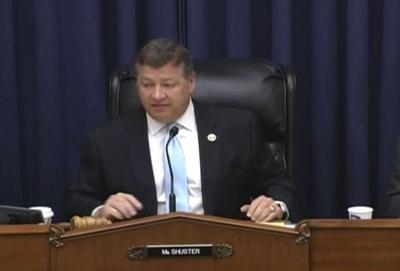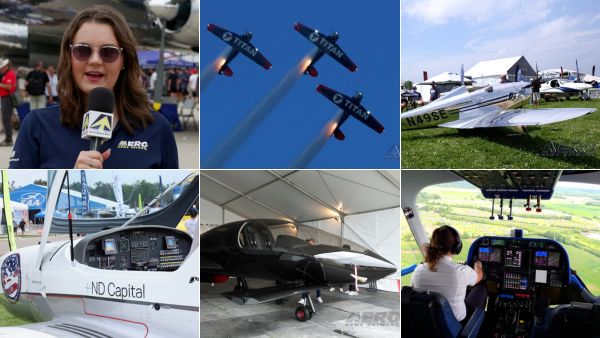Releases Editorial Published In The Washington Times
House Transportation Committee Chairman Bill Shuster (R-PA) is continuing his full-court press for passage of the House version of a reauthorization bill for the FAA which includes a plan to separate ATC from the FAA.

In an editorial written for The Washington Times and later released to the general media by the committee, Shuster ˆ(pictured) says that the AIRR act will cut taxes, reduce the size of government, and end decades of wasteful federal spending.
"The 21st Century Aviation Innovation, Reform, and Reauthorization Act (AIRR), up for House consideration before the end of September, achieves these goals while modernizing an increasingly antiquated American transportation system," the committee chairman wrote.
"The legislation provides long-overdue reforms of the Federal Aviation Administration (FAA). For instance, the legislation cuts bureaucracy to strengthen the global competitiveness of American aerospace manufacturers and encourage domestic growth in the burgeoning drone industry rather than driving those jobs overseas.
"This bill also fundamentally addresses our broken model of air traffic control (ATC) service and allows for modern technology to improve the safety and efficiency of our aviation system. The 21st Century AIRR Act separates ATC service from the FAA and establishes a not-for-profit service provider governed by actual aviation system users and stakeholders instead of bureaucrats. This new approach will finally allow the FAA to focus on what it does best: regulating aviation safety.
"In general, federal bureaucracies are functionally capable of providing regulatory oversight, but they are bad at providing a high-tech service and really bad at innovating — which is what ATC service is and requires. For proof, contrast the FAA’s commendable safety record to its well-documented 30-year record of waste and mismanagement of ATC modernization. The FAA has spent billions of taxpayer dollars in the name of modernizing our outdated ATC technology, but has failed to deliver the “transformational” results it promised."
Shuster says that the FAA has oversold its progress in implementing NextGen. He says the improvements made so far "disguise the fact that the FAA has continually moved the goalposts and dumbed down NextGen in order to enhance the optics of its performance. The Department of Transportation Inspector General actually has stated that the costs of NextGen, as originally envisioned, could swell from an estimated $40 billion to $120 billion and possibly be delivered by 2030 at the earliest. And this system, if ever delivered at all, will be decades behind schedule and already outdated by the time it’s actually fully implemented."
The committee chairman says that he U.S. ATC system still relies on World War II-era technology. Air traffic controllers do their jobs in part by passing along little paper strips that contain flight information. System delays and inefficiencies cost American passengers and businesses $25 billion every year, and delays are getting worse at many major airports. "Nearly every other modern country in the world has reformed its ATC service, allowing them to realize improvements in efficiency, safety and cost, and surpass us in technology.
It’s time to break the endless cycle of government waste and mismanagement of this important technology service," he wrote.
"The 21st Century AIRR Act moves thousands of air traffic controllers and other FAA employees out of the government, allows for private-sector efficiencies that are simply impossible within a government agency, and cuts taxes by 80 percent on the entire flying public by adjusting a tax scheme that has overcharged and under-delivered for the past 45 years.
"This bipartisan bill has broad support, both on and off Capitol Hill. Among the growing number of supporters are conservative and libertarian organizations and leaders such as Heritage Action, FreedomWorks, National Taxpayers Union, Competitive Enterprise Institute, Citizens Against Government Waste, Taxpayers for Common Sense, the Reason Foundation and many more.
He then takes aim at the aviation associations which are lobbying against passage of the bill. "In order to justify its own agenda of protecting a status quo that benefits its own small but well-heeled group of members, one vocal Washington special interest is attempting to stand in the way of this reform that will enhance our economy and help passengers spend less time stuck at an airport or on a tarmac.
"This lobbying group for owners of private planes, including major corporations, is promoting a false narrative that we have no alternative but to stay with our failed government system. They argue that reform successes in other countries — Canada’s not-for-profit model has led to over 40 percent lower ATC costs in its 20-year history — are simply unimaginable in the United States. Opponents claim our aviation system is just too big to succeed like the rest of the world and that only the government can provide ATC services. I reject that attitude.
"Functionally, ATC is the same throughout the world. It is a high-tech service for managing the movement of an airplane from one sector of airspace to the next.
"Just like the United States, Canada has sections of airspace over densely populated urban areas as well as swaths of rural regions. As a whole, our aviation system is larger and scaled to size and complexity, and we will continue to provide ATC service on a larger scale. That will not change. And while costs in Canada continue to go down, here in the United States, Congress continues to spend more to get less.
"People would laugh if you suggested that the federal government would do a better job building airliners or a cellphone network. Both of those businesses provide services that are highly complicated, require billions of dollars in capital investment and are subject to government oversight, just like air traffic service will continue to be.
"If the special interests get their way, this rare opportunity for Congress to break the cycle of Washington dysfunction will be lost. Flight delays will continue to grow, and more tax dollars will be wasted by an agency that has long shown itself incapable of living up to its own promises.
"Ask yourself, whom do you trust to run an efficient high-tech service? The private sector and a balanced board of aviation system users who have the strongest interest in ensuring the most modern, efficient, and safest aviation system possible, or a government bureaucracy already responsible for three decades of waste and mismanagement? The answer should be obvious to all Americans."
(Image from file)
 ANN/Oshkosh Sponsor, Gleim Aviation, Is Ready To Teach You A Thing Or Two...
ANN/Oshkosh Sponsor, Gleim Aviation, Is Ready To Teach You A Thing Or Two... ANN Thanks Our Speedy Sponsor... Blackshape!!!
ANN Thanks Our Speedy Sponsor... Blackshape!!! Alpha Systems AOA Guides ANN Oshkosh Coverage
Alpha Systems AOA Guides ANN Oshkosh Coverage Airborne-Flight Training 07.17.25: Dual Ignition C172, CFI-ATP Course, FAA Boss
Airborne-Flight Training 07.17.25: Dual Ignition C172, CFI-ATP Course, FAA Boss Airborne 07.24.25: Spirit SE-1!, H55 eFlyer, King Schools
Airborne 07.24.25: Spirit SE-1!, H55 eFlyer, King Schools



